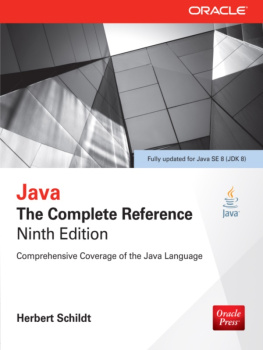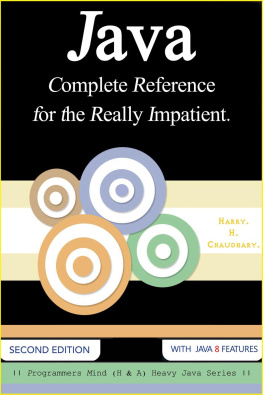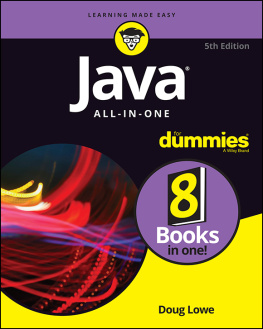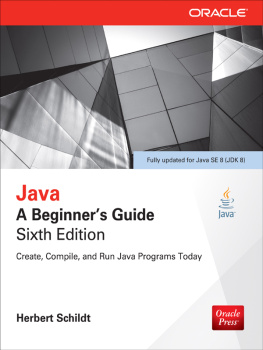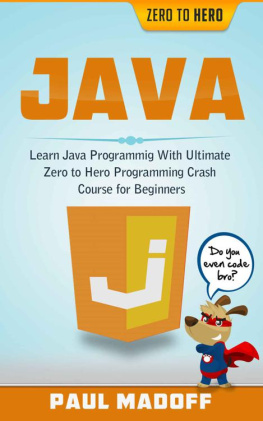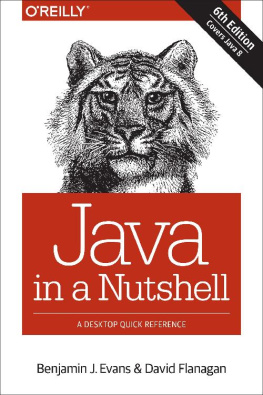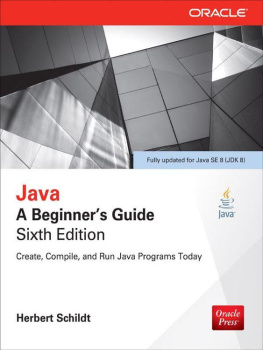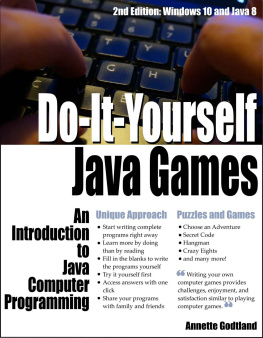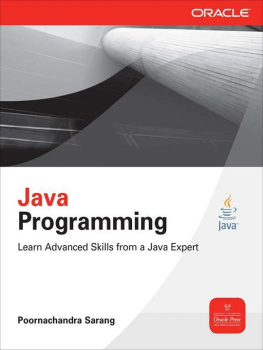The Complete Reference | Java Ninth Edition |
About the Author
Best-selling author Herbert Schildt has written extensively about programming for nearly three decades and is a leading authority on the Java language. His books have sold millions of copies worldwide and have been translated into all major foreign languages. He is the author of numerous books on Java, including Java: A Beginners Guide, Herb Schildts Java Programming Cookbook, and Swing: A Beginners Guide. He has also written extensively about C, C++, and C#. Although interested in all facets of computing, his primary focus is computer languages, including compilers, interpreters, and robotic control languages. He also has an active interest in the standardization of languages. Schildt holds both graduate and undergraduate degrees from the University of Illinois. He can be reached at his consulting office at (217) 586-4683. His web site is www.HerbSchildt.com.
About the Technical Editor
Dr. Danny Coward has worked on all editions of the Java platform. He led the definition of Java Servlets into the first version of the Java EE platform and beyond, web services into the Java ME platform, and the strategy and planning for Java SE 7. He founded JavaFX technology and, most recently, designed the largest addition to the Java EE 7 standard, the Java WebSocket API. From coding in Java to designing APIs with industry experts, to serving for several years as an executive to the Java Community Process, he has a uniquely broad perspective into multiple aspects of Java technology. Additionally, he is the author of JavaWebSocket Programming and an upcoming book on Java EE. Dr. Coward holds bachelors, masters, and doctorates in mathematics from the University of Oxford.
The Complete Reference | Java Ninth Edition |
Herbert Schildt
New York Chicago San Francisco
Athens London Madrid Mexico City
Milan New Delhi Singapore Sydney Toronto
Copyright 2014 by McGraw-Hill Education (Publisher). All rights reserved. Printed in the United States of America. Except as permitted under the Copyright Act of 1976, no part of this publication may be reproduced or distributed in any form or by any means, or stored in a database or retrieval system, without the prior written permission of Publisher, with the exception that the program listings may be entered, stored, and executed in a computer system, but they may not be reproduced for publication.
ISBN: 978-0-07-180856-9
MHID: 0-07-180856-6
e-Book conversion by Cenveo Publisher Services
Version 1.0
The material in this eBook also appears in the print version of this title: ISBN: 978-0-071-80855-2, MHID: 0-07-180855-8.
McGraw-Hill Education eBooks are available at special quantity discounts to use as premiums and sales promotions, or for use in corporate training programs. To contact a representative, please visit the Contact Us pages at www.mhprofessional.com.
All trademarks are trademarks of their respective owners. Rather than put a trademark symbol after every occurrence of a trademarked name, we use names in an editorial fashion only, and to the benefit of the trademark owner, with no intention of infringement of the trademark. Where such designations appear in this book, they have been printed with initial caps.
Information has been obtained by McGraw-Hill Education from sources believed to be reliable. However, because of the possibility of human or mechanical error by our sources, McGraw-Hill Education, or others, McGraw-Hill Education does not guarantee the accuracy, adequacy, or completeness of any information and is not responsible for any errors or omissions or the results obtained from the use of such information.
Oracle and Java are registered trademarks of Oracle Corporation and/or its affiliates. All other trademarks are the property of their respective owners, and McGraw-Hill Education makes no claim of ownership by the mention of products that contain these marks.
Screen displays of copyrighted Oracle software programs have been reproduced herein with the permission of Oracle Corporation and/or its affiliates.
TERMS OF USE
This is a copyrighted work and McGraw-Hill Education (McGraw Hill) and its licensors reserve all rights in and to the work. Use of this work is subject to these terms. Except as permitted under the Copyright Act of 1976 and the right to store and retrieve one copy of the work, you may not decompile, disassemble, reverse engineer, reproduce, modify, create derivative works based upon, transmit, distribute, disseminate, sell, publish or sublicense the work or any part of it without McGraw-Hills prior consent. You may use the work for your own noncommercial and personal use; any other use of the work is strictly prohibited. Your right to use the work may be terminated if you fail to comply with these terms.
THE WORK IS PROVIDED AS IS. McGRAW-HILL AND ITS LICENSORS MAKE NO GUARANTEES OR WARRANTIES AS TO THE ACCURACY, ADEQUACY OR COMPLETENESS OF OR RESULTS TO BE OBTAINED FROM USING THE WORK, INCLUDING ANY INFORMATION THAT CAN BE ACCESSED THROUGH THE WORK VIA HYPERLINK OR OTHERWISE, AND EXPRESSLY DISCLAIM ANY WARRANTY, EXPRESS OR IMPLIED, INCLUDING BUT NOT LIMITED TO IMPLIED WARRANTIES OF MERCHANTABILITY OR FITNESS FOR A PARTICULAR PURPOSE. McGraw-Hill and its licensors do not warrant or guarantee that the functions contained in the work will meet your requirements or that its operation will be uninterrupted or error free. Neither McGraw-Hill nor its licensors shall be liable to you or anyone else for any inaccuracy, error or omission, regardless of cause, in the work or for any damages resulting therefrom. McGraw-Hill has no responsibility for the content of any information accessed through the work. Under no circumstances shall McGraw-Hill and/or its licensors be liable for any indirect, incidental, special, punitive, consequential or similar damages that result from the use of or inability to use the work, even if any of them has been advised of the possibility of such damages. This limitation of liability shall apply to any claim or cause whatsoever whether such claim or cause arises in contract, tort or otherwise.
Contents at a Glance
Contents
Preface
J ava is one of the worlds most important and widely used computer languages. Furthermore, it has held that distinction for many years. Unlike some other computer languages whose influence has waned with the passage of time, Javas has grown stronger. Java leapt to the forefront of Internet programming with its first release. Each subsequent version has solidified that position. Today, it is still the first and best choice for developing web-based applications. Simply put: much of the modern world runs on Java code. Java really is that important.

